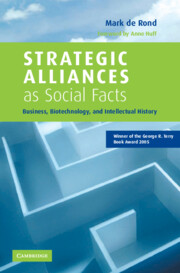Book contents
- Frontmatter
- Contents
- List of figures
- Foreword by Anne Sigismund Huff
- Acknowledgements
- Introduction
- 1 Paradoxes of alliance life
- 2 The context of drug discovery
- 3 Through the looking glass 1: Rummidgen and Plethora
- 4 Through the looking glass 2: Cambiogen and Plethora
- 5 Through the looking glass 3: Bionatura and Pflegum Courtal
- 6 Putting two and two together: revisiting theory and practice
- 7 Strategy, structure, and structuration: the general in the particular
- 8 The hedgehog and the fox: the particular in the general
- 9 The legitimacy of messiness
- Appendix: On methodology and definitions
- References
- Index
2 - The context of drug discovery
Published online by Cambridge University Press: 22 September 2009
- Frontmatter
- Contents
- List of figures
- Foreword by Anne Sigismund Huff
- Acknowledgements
- Introduction
- 1 Paradoxes of alliance life
- 2 The context of drug discovery
- 3 Through the looking glass 1: Rummidgen and Plethora
- 4 Through the looking glass 2: Cambiogen and Plethora
- 5 Through the looking glass 3: Bionatura and Pflegum Courtal
- 6 Putting two and two together: revisiting theory and practice
- 7 Strategy, structure, and structuration: the general in the particular
- 8 The hedgehog and the fox: the particular in the general
- 9 The legitimacy of messiness
- Appendix: On methodology and definitions
- References
- Index
Summary
There is a wonderful paragraph in Kary Mullis's Dancing Naked in the Mind Field:
In the early weeks of 1968 I submitted an article I had written to the foremost scientific journal in the world, Nature, published in London. I called it ‘The Cosmological Significance of Time Reversal’ and congratulated myself on its cleverness … I was a second-year graduate student in biochemistry at Berkeley. I had read a lot about astrophysics and had taken some psychoactive drugs, which enhanced my perceived understanding of the cosmos. Not very good reasons to think that an international journal of science would want to publish my views for the edification of their very knowledgeable readership. It was accepted. … Years later I invented the polymerase chain reaction (PCR). I was a professional scientist, and knew what I had discovered. It was not the speculations of a kid about the universe and time reversal. It was a chemical procedure that would make the structures of the molecules of our genes as easy to see as billboards in the desert and as easy to manipulate as Tinkertoys … I knew that PCR would spread across the world like wildfire. This time there was no doubt in my mind: Nature would publish it. They rejected it. So did Science, the second-most prestigious journal in the world. Science offered that perhaps my paper could be published in some secondary journal, as they felt it would not be suitable to the needs of their readers. [Screw] them, I said.
(2000: 103–5)- Type
- Chapter
- Information
- Strategic Alliances as Social FactsBusiness, Biotechnology, and Intellectual History, pp. 34 - 54Publisher: Cambridge University PressPrint publication year: 2003



